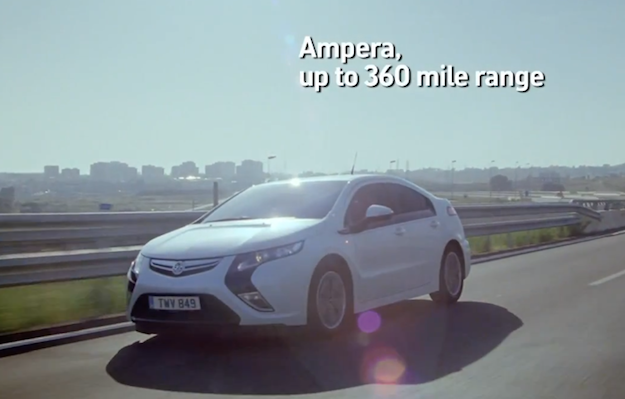 A television advert for the Vauxhall Ampera, or Chevrolet Volt as it’s known in the USA, has been deemed to be misleading by the Advertising Standards Agency in the UK.
A television advert for the Vauxhall Ampera, or Chevrolet Volt as it’s known in the USA, has been deemed to be misleading by the Advertising Standards Agency in the UK.
It’s a simple advert, comparing the Ampera to several athlete’s incredible physical achievements, and closes with the onscreen statement “Ampera, up to 360 mile range,” while narrator Patrick Stewart says “Driving electricity further” as the car disappears into the distance.
The combination of those statements, plus the more subtle presence of power lines and the healthy, wooded area through which the Ampera drives, suggests the car is a lean, green, solely electrically powered machine.
It also led three people to complain to the ASA that the advert was misleading. The reason? It suggests the car can travel 360 miles using only electricity.
This is true, but not quite accurate, as after between 38 and 50 miles, the car switches from electric power to something called a “range extender,” which is a gas-driven generator. On a full tank, the car can then run for another 310-plus miles before requiring some kind of fuel — be it electricity or gas to generate it.
Heated debate
Vauxhall argues that since the engine isn’t connected to the wheels, its small-print at the base of the screen clears them of any deception. The small-print says “Comparison based on electric vehicles and extended-range electric vehicles driven electrically at all times, even when an additional power source is generating electricity.”
While it does acknowledge the presence of a “range extender” system, not everyone knows what this means, and as there is no mention of an internal combustion engine at all, the ASA decided to uphold the complaint and ban the ad in its current form.
Vauxhall’s marketing folk will have to come up with a revised advert before it can be shown on UK TV screens again. By comparison, US adverts for the Volt include this informative spot, which describes in detail how the car works, while even the owner testimonials used the word “gas” in the small print when discussing range.
The operating range of electric cars is a subject that prompts heated debate. Nissan for example, in last year’s UK advert for the all-electric Leaf, avoided the subject altogether, while UK motoring show Top Gear famously incurred Tesla’s wrath in 2011, after it demonstrated the car’s limited range in a typically irreverent manner.
Vauxhall/GM isn’t helping the cause with this type of advert either. Range-extended electric cars are innovative and interesting, and the Ampera is a great-looking — although expensive — vehicle. Trying to attract uninformed customers this way shouldn’t really be necessary.



